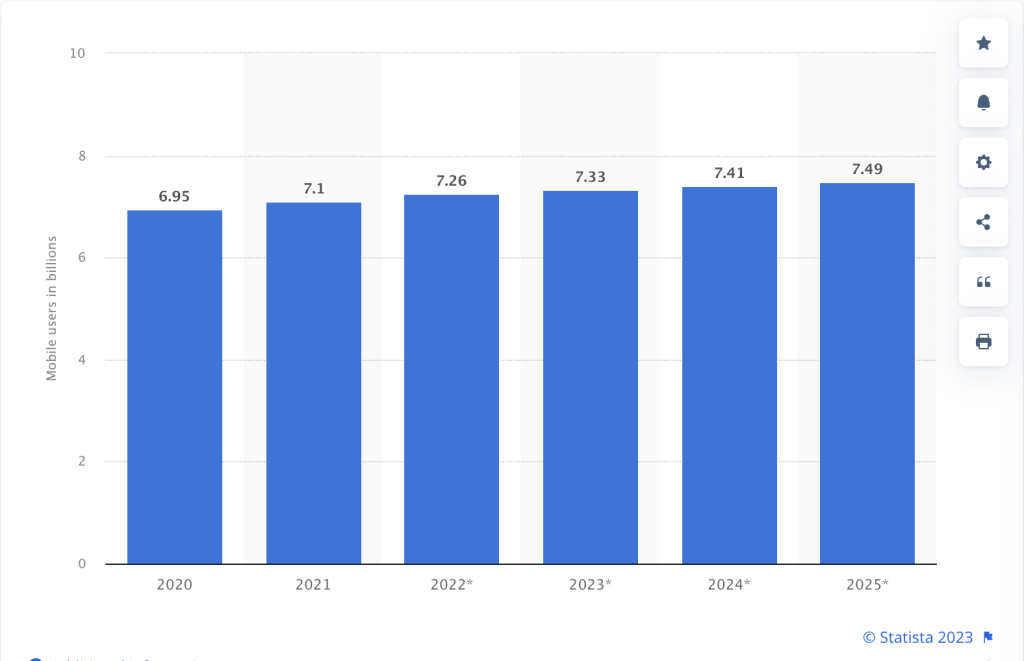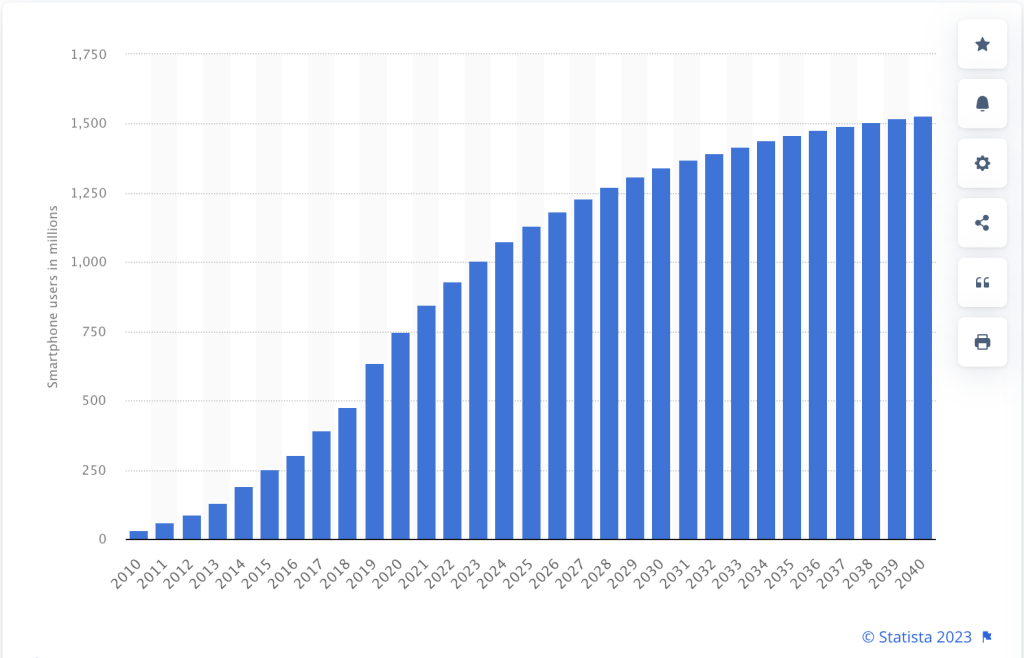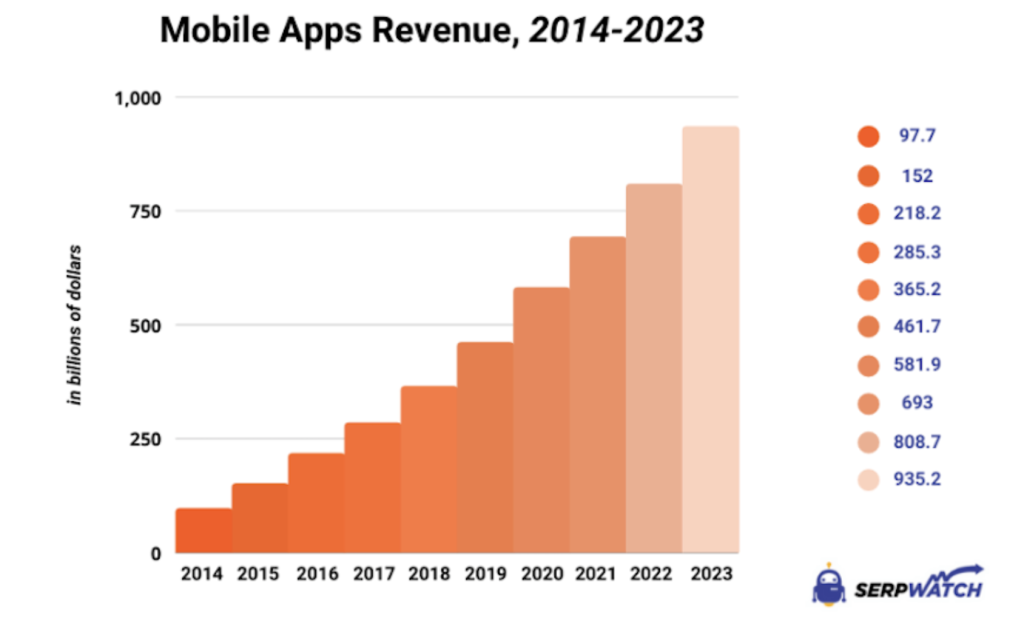With the number of mobile users increasing tremendously, every business is focused on building and promoting its business using mobile phones. Worldwide number of mobile users stood at 7.1 billion in 2021. The number of mobile users are projected to reach 7.49 billion by 2025.
In India alone, the number of Smartphone users will cross over 1 billion in 2023. It is expected to exceed 1.5 billion users by 2040.
Mobile Applications play a vital role in today’s business with the businesses directly reaching the customers through their mobile applications. These Mobile applications help the customers in shopping, making payments, booking vehicles for transport, delivering food, etc.
With the businesses flourishing as the customers have full power using mobile applications to book their order and get it delivered at their doorstep. Mobile applications are expected to generate a revenue of over $935 billions in 2023.
With all these statistics focusing around mobile applications. It is the responsibility of the businesses to deliver a quality, bug free mobile application to its users. The application should be fair enough to perform all the functionalities seamlessly to keep the customers attached to the business otherwise it may result in negative ratings eventually resulting in business loss.
Challenges faced while performing Mobile app testing Manually
As mentioned earlier, manual testing requires a lot of effort and is tedious as the tester has to perform all the tests manually by reading the business specifications, writing test scenarios, cases, etc. The following challenges are faced by the testing team while testing a mobile application manually –
Need for physical Real devices
The main challenge in manually testing mobile applications is to get the physical devices for testing. With different Platforms, Versions, Mobile vendors and millions of users, it is necessary to perform testing on popular devices on the latest platform and respective versions.
Performing testing on every real device is difficult as it would need the respective devices to be made available which is almost impossible as there are limitations with respect to the available budget.
Support for Oldest/Latest version/ device model/OS/OS versions
The mobile application tests need to be performed on the basic and the latest versions of the Operating Systems. For example, say, a mobile application on Android supports Android version 9 and latest version 13. It becomes necessary to test the application in a mobile device running the Android version 9 and also in a device with the latest version 13 to check the compatibility and stability of the application in both the versions and every version inbetween. Again this requires us to either buy or rent these devices physically for testing purposes. Also, it would need a good amount of time for testing the application on multiple mobile devices to check the stability and quality of the application, let alone the infrastructure needed for it.
Costly
As mentioned earlier, the cost is a prominent factor. Due to budget constraints, it is not possible to purchase all the devices that would be required for testing. Another factor on the cost aspect is employing multiple manual testers to get the work done within the stipulated time as the mobile application needs to be released quickly hence testing needs to be completed at the earliest.
Less Efficient
As testing is performed manually, it may lead to errors and issues getting unnoticed. Hence, the efficiency and quality of the build might be hit due to it. Production issues may lead to negative application ratings eventually leading to business loss.
Setup and configuration is time consuming
Installing the application on a device manually, updating the configuration and changing the required settings, adds up to the test scenario/case execution time. For each scenario, the tester might need to fine tune the settings and also update the configuration which is a tedious task and eventually adds to the testing time.
What is Automated Mobile App testing?
Automated Mobile App testing refers to performing the mobile application testing by validating the functionality using automated tools and verifying that the mobile application is working as it is intended to do. Using different mobile app testing strategies, automated mobile app testing can be performed efficiently.
Using mobile automation tools, tests on multiple devices, platforms and different OS versions can be performed seamlessly without putting in manual efforts. It helps in saving the time as well as getting free from human errors that may happen due to repetitive tests.
To make a robust, stable and quality mobile app, testing is an important part that needs to be taken care of. However, with the businesses demanding new features and frequent releases, Automated Mobile app testing is the need of the hour.
Why should Automated Mobile App testing be performed?
One of the most important advantages in performing Automated Mobile App testing is that the companies can release their apps frequently to the market ensuring businesses with quicker returns on investment. Other benefits are as follows –
Fast Feedback
Getting fast feedback on builds helps to fix the issues in the early stage of development. It helps in building quality applications. With faster feedback, it is less costly and takes less time to fix the issues whereas if the issue is found in a later stage of development it takes more time to fix that might affect the deliverables.
Test on Multiple platform, devices seamlessly
Once the automated tests are written. The next part is to run it using an appropriate mobile device, selecting the required platform like iOS, Android and its respective versions. As there are multiple platforms with different versions and ample devices in the market today, it is very important to choose the devices that are used by most of the users.
With automated tests already in place, respective configurations can be set to execute the tests on required devices easily without putting in much effort. Even cloud platforms like Pcloudy can be used to run the tests.
Pcloudy has support for multiple Operating Systems like iOS, Android, etc and also provides on demand mobile devices for performing seamless automated mobile application testing.
Automated Regression Testing with less Manual Intervention
Regression testing refers to retesting the existing features of the application to check if it works as expected after a new feature has been introduced or a bug has been fixed in the application. Running regression tests manually needs lots of time and also is prone to human errors as it is a tedious task.
With automated mobile app testing, the tedious regression tasks can be performed in quick time without putting in manual efforts. The automated tests can be rerun multiple times with efficiency.
Parallel Testing
Running tests in parallel is another benefit gained by automated mobile app testing. Parallel testing refers to running tests in parallel in different mobile devices having different Operating System and versions.
For example, if running a single mobile application test takes around 2 mins, and if we need to run the same tests in 3 different devices with different OS and OS version variations, it would need 6 mins to complete all 3 tests.
However, using Parallel tests all of the tests can be run at the same time and can be completed in approximately 2 minutes saving the additional 4 mins.
Time and Cost Effective
Automated testing helps in saving the time by running the tests quickly as and when required once the tests are written, whereas running the same tests manually may need more time. Also, these tests can be run on automated pipelines that can help in deploying the builds on different environments automatically, thus saving the manual deployment time as well.
The role of cloud platforms in automated mobile app testing
With the cloud platforms coming into existence most of the challenges faced by the testing teams with regards to infrastructures has been solved. The following are some of the major benefits that can be leveraged –
Testing on Real Devices Seamlessly
Cloud platforms provide on demand mobile device availability using which tests can be run on real mobile devices with latest versions and popular devices. As the devices are available on cloud, tests can be run seamlessly.
Geolocation Testing
Many cloud platforms provide the feature to modify the geolocation and perform the testing. In the work from home model, where all the teams are scattered geographically, let say, the application under development is planned to be released in London, however the development team works from the US and the testing team is in India. When it comes to testing, the first case that needs to be checked is, the mobile application should be available for download in the London region only.
To test this scenario, we can use the Geolocation feature in cloud platforms and modify and set the device location to London to perform the location based testing.
Parallel Testing
Using cloud platforms, tests can be run in parallel on different devices, operating systems and its different versions. Parallel testing helps in saving the testing time that helps in fast feedback and early delivery of the application to the market.
Real Devices on Demand
Getting real devices for testing on demand is another advantage provided by cloud platforms. We can choose a real device from the wide variety of real mobile devices ranging from Android to iOS as per our requirement. This makes things easier for the testing team to focus and run their tests on the popular devices without having to buy the devices physically.
Cloud platforms also help in providing the latest real devices needed for testing as these platforms procure the mobile devices as soon as they are released in the market. This helps with testing on the latest devices promptly. This in turn helps teams to verify the mobile application’s stability and compatibility on the latest mobile devices without the hassle of acquiring devices or the cost associated with it.
Run tests from anywhere
After purchasing the required cloud based license and getting the credentials, we just need a computer or laptop to operate and use cloud platforms. After logging in to the cloud platforms, we can simply run our tests from anywhere. This is a major benefit as we don’t need any setup and configuration to be done at our end. It is all handled by the cloud platform teams.
Automation Tools/Frameworks used for automated mobile app testing
The following are some of the popular mobile application automation testing tools and frameworks.
Appium
Appium is an open source mobile test automation framework that helps in automating Android as well as iOS mobile applications. It has support for programming languages like Java, JavaScript, Python, Ruby, etc. It is a popular framework widely used by many organizations to automate their mobile application.
WebDriverIO
WebdriverIO is another popular mobile automation framework that helps in automating Android and iOS mobile applications. WebdriverIO tests can be written using JavaScript and TypeScript programming languages. The advantage of using WebdriverIO is that it provides support to automate the web applications as well. With minimal configuration and setup, mobile app automation
Pcloudy
Pcloudy is a cloud platform that provides real mobile devices lab and also browsers for running automated tests. Its mobile device lab offers multiple plans like pay as you go model and unlimited mobile device usage that can help perform automated mobile app testing efficiently.
Conclusion
Automated mobile app testing can help in reducing mobile application’s the release time to the market. It helps in providing faster feedback on the builds that can help save lots of time and avoid releasing the issues into production. Adopting automated mobile app testing is the need of the hour if you want to keep up the pace with the current market trends. Using automation tools like Appium, WebdriverIO and Pcloudy, tests can be seamlessly run on the cloud platforms providing us with a quality mobile application.
Happy Testing!





 February 21, 2024
February 21, 2024
 November 30, 2023
November 30, 2023




